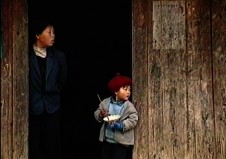What About China? with Trinh T. Minh-ha in person

What About China?
Los Angeles Premiere!
Sunday December 15, 2024, 7:00pm
At 2220 Arts + Archives, 2220 Beverly Blvd., Los Angeles CA 90057
Conversation after with Trinh Minh-ha
NOTE THE EARLIER START TIME
Tickets: $15 general, $10 students/seniors, and free for Filmforum members
Trinh T. Minh-ha’s first feature film Naked Spaces – Living Is Round (1985) will have its restoration premiere at the Academy Museum the night before, December 14, 7:30 pm, with Trinh in person.
Nearly a half century after the Cultural Revolution, images of the Asian superpower as friend or foe to a beleaguered, industrialized West belie a mercurial nature that fascinates in this latest video essay by esteemed UC Berkeley professor and experimental filmmaker Trinh T. Minh-ha. Similar to Forgetting Vietnam (2015), low-res video footage shot 30 years ago of Chinese rural life centering on women, children, labor, and family is reanimated and reframed through photomontage, oral histories, travelogues, poetry, and folk songs in order to interrogate what China has been, is, and could be. The generational transmission of values and ideas weighs heavily, impacting identity formation at home and in diaspora. Like seminal works, Surname Viet Given Name Nam (1989), Shoot for the Contents (1991), and Forgetting Vietnam (2015), the materiality of texts (video, sound, this film) captures the effect experienced by global citizenry. – Courtesy of SFFILM, written by Lindy Leong
Special Thanks to Mark Toscano, K.J. Relth-Miller
ABOUT THE FILMMAKER:
Filmmaker, writer, composer Trinh T. Minh-ha is a Distinguish Professor of the Graduate School at the University of California, Berkeley. Her work includes: 1) nine feature-length films (including What About China? 2021, Forgetting Vietnam, 2016, Night Passage, 2004, The Fourth Dimension, 2001, A Tale of Love, 1996, Shoot for the Contents, 1991, Surname Viet Given Name Nam, 1989, Naked Spaces, 1985, and Reassemblage, 1982) honored in some sixty-nine retrospectives around the world; 2) several largescale multimedia installations, including In Transit (Manifesta 13, Marseille, 2020) L’Autre marche (Musée du Quai Branly, Paris 2006-2009), Old Land New Waters (3rd Guangzhou Triennial, China 2008, Okinawa Museum of Fine Arts 2007), The Desert is Watching (Kyoto Biennial, 2003); and 3) numerous books, such as Lovecidal. Walking with The Disappeared (2016), D-Passage. The Digital Way (2013), Elsewhere, Within Here (2011), Cinema Interval (1999), and Woman, Native, Other: Writing Postcoloniality and Feminism (1989),
Her many awards include; the 2014 Wild Dreamer Lifetime Achievement Award at the Subversive Film Festival, Zagreb; the 2012 Lifetime Achievement Award from Women's Caucus for Art; the 2012 Critics Choice Book Award of the American Educational Studies Association; the 2006 Trailblazers Award at MIPDoc in Cannes, France; and the 1991 AFI National Independent Filmmaker Maya Deren Award.
Her latest film, What About China? has received the 2022 New:Vision Award at CPH:DOX Film Festival in Copenhagen; The 2022 Golden Gate Persistence of Vision Award at the San Francisco Int. Film Festival and the Prix Bartók at the 2022 Jean Rouch Film festival, the Inspiration Award at Viet Film Fest, a Special Commendation at the BFI London Film Festival and the Presidential Award at the Royal Anthropological Institute of Great Britain and Ireland Film Festival

What About China?
What About China?
China, 2022, Digital, color, sound, 135 minutes
Director, Writer, Editor, Camera: Trinh Minh-ha; Music/Sound: Wu Wei, Cao Xiyun, Liz Lui, Ming Bo, Qin E
Drawing from footages shot mostly in 1993–1994 in villages of Eastern and Southern China linked in common lore to the remote origins of China’s civilizations, the film takes the notion of harmony in China as a site of creative manifestation. Highly valued as a virtue and a guiding criterion in ethics, harmony has played an important role in the lives of Chinese people since ancient times. It encompasses the fundamental principles of nature, society and humanity, summing up three main relations: harmony with society; harmony with nature; and harmony with oneself.
In the film, "harmony" involves not only the way music fundamentally defines reality, or the way space takes shape and structures daily life, but also the dynamic agents in the ongoing process of safeguarding the "roundness" of a world of social equity. Offering a journey into the wealth of China’s traditional architecture while exploring the hinterlands of self and other in their encounter, the film addresses the process of "harmonizing" rural China, due to the country's Great Uprooting. It seeks to engage the viewer further by asking: What exactly is disappearing? And how?
The viewer is invited to fare between ancient wisdom, avant-garde experiment and popular folk acumen as the film taps on the rich realm of affect, featuring a multiplicity of voices and narratives embedded in a rhythmic conversation between the still image and the moving image. Like the ancient painter who dreams of windows, the film and video maker devises mobile windows with passageways where the real and the imaginary converge on the light canvas.
"Prominent feminist film scholar Trinh presents a hugely imaginative cultural critique of China that resists the idea of a single historical narrative, instead evoking the plurality of indigenous perspectives." -- Hyun Jin Cho, IMDB
Trinh’s reflexivity can be subtly felt throughout the film, a gentle reminder that history is a construct, one in which she is taking part. Her zoomed-in camera roves slowly through Guo Xi’s paintings, bringing the viewer deliberately close, before zooming out to present the full work, the bigger picture. -- Casey Wei, Reissue
Trinh T. Minh-ha’s admirers, myself included, would do well to learn from her filmmaking methods of speaking without objectifying, and of coming close to a subject without seizing or claiming it. -- Shivani Radhakrishnan, Bomb Magazine
Prix Bartók, Jean Rouch Film Festival
New Vision Award, CPH:DOX
Golden Gate Persistence of Vision Award, San Francisco International Film Festival
Special Commendation, BFI London Film Festival
